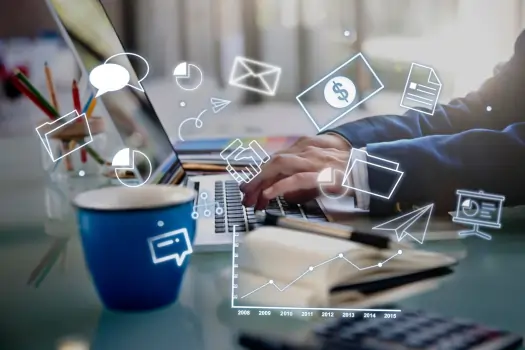Marketing automation is necessary for any organization to optimize its revenue scaling strategies. Rapid technological advancements in the upcoming years will present exciting opportunities to transform marketing.
Automation tools are now more intelligent, easier to use, and more effective in helping businesses improve their operations and interact with customers.
What are marketing automation trends?
In 2025, marketing automation services will witness significant trends poised to reshape the industry. The focus will be on full-funnel omnichannel marketing, driving the adoption of advanced marketing automation tools to enable personalized strategies across diverse channels to address the audience's specific needs.
Integrating advanced technologies such as artificial intelligence (AI) will enhance the capabilities of marketing automation services, leading to improved customer experiences and more personalized interactions.
Additionally, the rise of account-based marketing (ABM) will leverage automated systems to deliver tailored, multi-channel campaigns, propelling marketing automation services into a new era of hyper-targeted strategies.
Top 8 Marketing Automation Trends
Automation software collects data from various touchpoints, such as email clicks, website visits, and app usage. Potential customers are identified, and personalized campaigns are created to engage them across digital channels like social media and email. Cross-channel workflows are set up to trigger actions based on customer behavior, such as:
1. Integration of Machine Learning and Artificial Intelligence
Machine Learning and Artificial Intelligence are pivotal in automating marketing processes. Their application spans critical tasks such as segmentation, lead scoring, and behavioral analytics. Studies show that 41% of marketers have reported increased sales and revenue after integrating AI into their campaigns.
AI’s influence extends to content marketing, as it helps businesses quickly develop content marketing strategies and create content. By analyzing customers' behavior, AI-based tools help develop more relevant and engaging content, thus increasing the chances of reaching out to potential customers.
2. Mobile Marketing Automation
Mobile traffic remains dominant and is expected to reach 5.7 Billion internet users by 2025, most accessing the internet through mobile devices. This means that businesses need to focus on mobile marketing to remain relevant.
Automation tools like SMS marketing, in-app ads, and push notifications help brands improve their mobile presence. Marketers should also focus on creating mobile-friendly content. Video is emerging as a preferred format due to its higher click-through and conversion rates.
3. Omnichannel Marketing
Modern consumers interact with brands across multiple devices and platforms, often switching between them throughout the day.
A Google study reveals that users frequently operate three devices simultaneously, meaning the customers’ experience should be seamless.
Omnichannel marketing ensures a unified and seamless experience across various touchpoints, making it an essential automation trend. Businesses can reach audiences best by consistently using data and strategies through desktop, mobile, or other channels.
4. Social Media Marketing Automation
Currently, more than 4.62 billion active social media users spend an average of two hours and 27 minutes daily on social media, making social media an essential tool for marketers.
Automation tools streamline social media management by scheduling posts, automating responses, and maintaining brand presence. Tools like Hootsuite and Buffer allow marketers to plan and execute campaigns in advance, saving time and ensuring consistency.
Social media automation also boosts lead generation and ROI, with 39% of businesses planning to integrate such solutions into their strategies.
5. Chatbots and Conversational Marketing
AI-powered chatbots have transformed customer interaction by providing 24/7 assistance without the overhead of maintaining large call centers. Modern chatbots use NLP to interact with customers in a way similar to human interactions with others.
Conversational marketing creates a two-way dialogue, fostering deeper connections with customers. By using automation to personalize interactions, businesses can build trust and deliver a superior customer experience, all while reducing operational costs.
6. Personalized Email Marketing Automation
At present, simply addressing recipients by name will not be enough. With advanced automation tools, marketers can analyze customer data, segment audiences, and send personalized emails that resonate with individual preferences.
Examples of automated personalized emails include:
-
Discounts or coupon codes.
-
Reminders for abandoned cart items.
-
Notifications about new product launches.
These strategies help improve customer loyalty and engagement, fostering long-term relationships with your audience.
7. Marketing Funnel-Optimized Content
Customer journey mapping is crucial to increase conversion rates. Automated tools help businesses deliver content optimized for different stages of the marketing funnel automation, ensuring leads are nurtured effectively.
Marketers can guide prospects through the funnel by analyzing data and setting up automated workflows with relevant content. This approach saves time and increases the chances of turning leads into customers.
8. Automated Data Transfers
The importance of data in modern marketing is uncompromisable, as it offers insights into customer behavior and campaign performance. However, manually transferring data between platforms is time-consuming and prone to errors.
Automation tools simplify data transfers, ensuring accuracy and efficiency. As businesses prioritize data-driven decision-making, this trend will remain a cornerstone of marketing automation.
Key benefits of knowing marketing automation trends
Marketing automation offers several advantages to help businesses streamline their processes and improve results. Here are some key advantages:
1. Personalized Customer Journeys
Marketing automation helps create tailored experiences for customers.
Instead of manually tracking interactions, automation platforms automatically guide leads through the sales funnel with relevant content.
This reduces the workload on the marketing team while ensuring customers receive the right messages at the right time.
2. Improved Customer Engagement
Automation tools increase customer engagement by allowing businesses to set up drip campaigns and lead scoring.
These features ensure businesses maintain consistent communication with leads and customers, preventing missed opportunities and improving overall engagement.
3. Cross-Channel Marketing Campaigns
Marketing automation makes it easier to run cross-channel campaigns. With integrated tools, businesses can manage marketing efforts across various platforms, such as email, SMS, and social media, all from one place.
This ensures a consistent customer experience and reduces the need for manual work. As a result, businesses have a steady flow of high-quality leads.
Conclusion
Marketing automation is all about innovation, personalization, and seamless customer experiences. These marketing automation trends are changing how we communicate with the target audience, and Saffron Edge is here to assist you with these changes.
The most advanced marketing automation tools help businesses maintain their competitive advantage and reach their objectives.
Ready to take your marketing strategy to the next level? Contact us today to learn how we can help you integrate these trends into your business for optimal growth and success.
Get The Marketing Automation Toolkit
Frequently Asked Questions
What are the current emerging trends in marketing automation services for 2025?
Some emerging trends in marketing automation services for 2025 include a focus on full-funnel omnichannel marketing, the integration of advanced technologies like artificial intelligence, a rise in account-based marketing strategies, and an emphasis on personalized customer experiences.
How can businesses leverage marketing automation tools to enhance customer engagement and personalization?
Businesses can leverage marketing automation tools by using data-driven insights to create targeted and personalized campaigns, implementing automated lead nurturing processes, and utilizing behavior-based triggers to engage customers at the right time with relevant content.
What role does artificial intelligence (AI) play in shaping the future of marketing automation services?
AI plays a crucial role in the future of marketing automation services by enabling predictive analytics, personalized recommendations, automated content generation, chatbots for customer interactions, and advanced data analysis to improve overall marketing strategies and campaign performance.
How can account-based marketing (ABM) strategies be integrated into marketing automation for targeted campaigns?
ABM strategies can be integrated into marketing automation by segmenting target accounts based on specific criteria, delivering personalized content to each account, automating outreach and follow-up processes, and tracking engagement to optimize campaign performance and ROI.
What are some key challenges businesses may face when implementing marketing automation services?
Some key challenges businesses may face when implementing marketing automation services include data quality issues, integration complexities with existing systems, aligning marketing and sales teams, generating relevant and engaging content at scale, and ensuring compliance with data privacy regulations.
What are the benefits of adopting a full-funnel omnichannel marketing approach with marketing automation tools?
Adopting a full-funnel omnichannel marketing approach with marketing automation tools helps businesses create cohesive customer experiences across multiple channels, improve lead generation and nurturing, enhance customer retention and loyalty, and optimize marketing ROI by tracking and analyzing customer interactions at every stage of the funnel.
How can businesses stay updated on the latest marketing technology (Martech) to optimize their marketing automation strategies?
Businesses can stay updated on the latest marketing technology by attending industry conferences and webinars, subscribing to reputable marketing publications and blogs, participating in Martech training programs, networking with other marketing professionals, and regularly evaluating new Martech tools and platforms.
What are some best practices for measuring the effectiveness and ROI of marketing automation services in 2025?
Some best practices for measuring the effectiveness and ROI of marketing automation services in 2025 include setting clear objectives and KPIs, leveraging analytics and reporting tools to track campaign performance, conducting A/B testing to optimize strategies, segmenting data for targeted analysis, and aligning marketing efforts with overall business goals to drive tangible results.
Related Blogs
We explore and publish the latest & most underrated content before it becomes a trend.
6 min read
Lead Nurturing Marketing Automation: How to Get Started
By Praveen Kumar7 min read
Five Digital Marketing Strategies that Grow Family Law Firms
By Nishant Ahlawat
Subscribe to Saffron Edge Newsletter!

Get The Marketing Automation Toolkit










